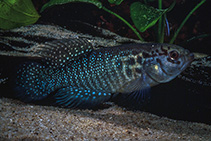| Family: |
Rivulidae (Rivulines), subfamily: Cynolebiinae |
| Max. size: |
12.53 cm SL (male/unsexed); 8.94 cm SL (female) |
| Environment: |
benthopelagic; freshwater; pH range: 5 - 6.5, non-migratory |
| Distribution: |
South America: Middle São Francisco River basin in Brazil. |
| Diagnosis: |
Dorsal soft rays (total): 17-19; Anal soft rays: 19-22; Vertebrae: 35-36. Second pharyngobranchial elongated. Convex dorsal profile above pectoral-fin base not pronounced. Larger males (>9 cm SL) with deeper body (35.5 - 36.8 % SL). Pelvic fin longer with tip reaching base of 4th anal fin rays. Dorsal-fin rays 17-19 in males, 17 in females; anal-fin rays 20-22 in males, 19-21 in females; caudal fin rays 30. Caudal and pectoral fin rounded. Snout gently pointed with lower jaw slightly elongated. Supraorbital neuromasts 31-42 (Ref. 40938). |
| Biology: |
Bottom spawner, ? months incubation (Ref. 27139). |
| IUCN Red List Status: |
Endangered (EN); Date assessed: 07 November 2018 (B1ab(ii,iii,iv)) Ref. (130435)
|
| Threat to humans: |
harmless |
Source and more info: www.fishbase.org. For personal, classroom, and other internal use only. Not for publication.

